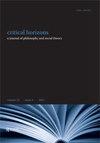From Workers’ Councils to Democratic Autonomy: Rediscovering Cornelius Castoriadis' Theory of Council Democracy
IF 0.4
Q3 SOCIAL SCIENCES, INTERDISCIPLINARY
引用次数: 0
Abstract
ABSTRACT Cornelius Castoriadis is one of the most important democratic thinkers in the second half of the twentieth century, and his theory of autonomy and the self-instituted character of society are fundamental to many post-Marxist theories of democracy. The role of the council system in Castoriadis' work, though, has rarely been investigated, and his analysis of the twentieth century workers' councils of has seldom been connected to his important concepts of autonomy and the instituting power. The article remedies this lack of engagement with Castoriadis' analysis of the council system and argues that the emergence of workers' councils in Castoriadis' own lifetime, during the Hungarian Revolution of 1956, provided a crucial impetus for his formulation of a theory of autonomy. Moreover, the article argues that the role of the council system in Castoriadis' work provides a privileged vantage point in order to nuance the critique – voiced by for example Jürgen Habermas and Claude Lefort – that Castoriadis exclusively valorise constituent politics without properly appreciating the importance of ordinary politics. Contrary to this interpretation, the article demonstrates how Castoriadis look to the councils to understand how democratic politics entails both freedom to act anew and the need for institutional structure.从工人代表会到民主自治:再发现卡斯托里亚迪斯的代表会民主理论
卡斯托里亚迪斯是20世纪下半叶最重要的民主思想家之一,他的自治理论和社会的自我建立特征是许多后马克思主义民主理论的基础。然而,在Castoriadis的著作中,委员会制度的作用很少被调查,他对20世纪工人委员会的分析也很少与他的自治和制度权力的重要概念联系起来。这篇文章弥补了Castoriadis对议会制度分析的缺失,并认为在Castoriadis的一生中,1956年匈牙利革命期间,工人委员会的出现为他提出自治理论提供了至关重要的动力。此外,这篇文章认为,议会制度在卡斯特里亚迪斯作品中的作用提供了一个特权的有利位置,以便细微差别地批评——例如j根·哈贝马斯和克劳德·勒福特——卡斯特里亚迪斯完全重视选民政治,而没有适当地认识到普通政治的重要性。与这种解释相反,这篇文章展示了Castoriadis如何通过理事会来理解民主政治如何既需要重新行动的自由,也需要制度结构。
本文章由计算机程序翻译,如有差异,请以英文原文为准。
求助全文
约1分钟内获得全文
求助全文

 求助内容:
求助内容: 应助结果提醒方式:
应助结果提醒方式:


